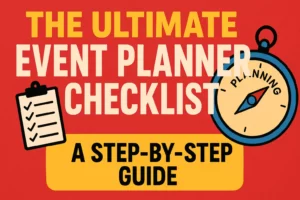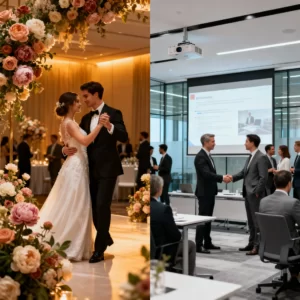Ultimate Wedding Planning Checklist: From Engagement to Post-Wedding Tasks
Congratulations on your engagement! Planning a wedding can be exciting but also overwhelming. A month-by-month wedding planning timeline keeps tasks manageable. In fact, experts say a year (roughly 12–15 months) is a typical planning period. When you’re working through your 12-month wedding planning checklist, one of the earliest decisions you’ll make is how to time and structure your ceremony and reception – our guide to Wedding Ceremony vs. Reception explains the key differences and helps you plan accordingly. Use this timeline to stay organized, book the right vendors early, and enjoy a stress-free lead-up to your big day.
If you’re on the East Coast, it’s worth exploring different venues in Washington DC to see which align with your vision. From modern rooftops to classic ballrooms, locking down your style early can simplify the rest of your decisions.
12+ Months Out (Just Engaged)
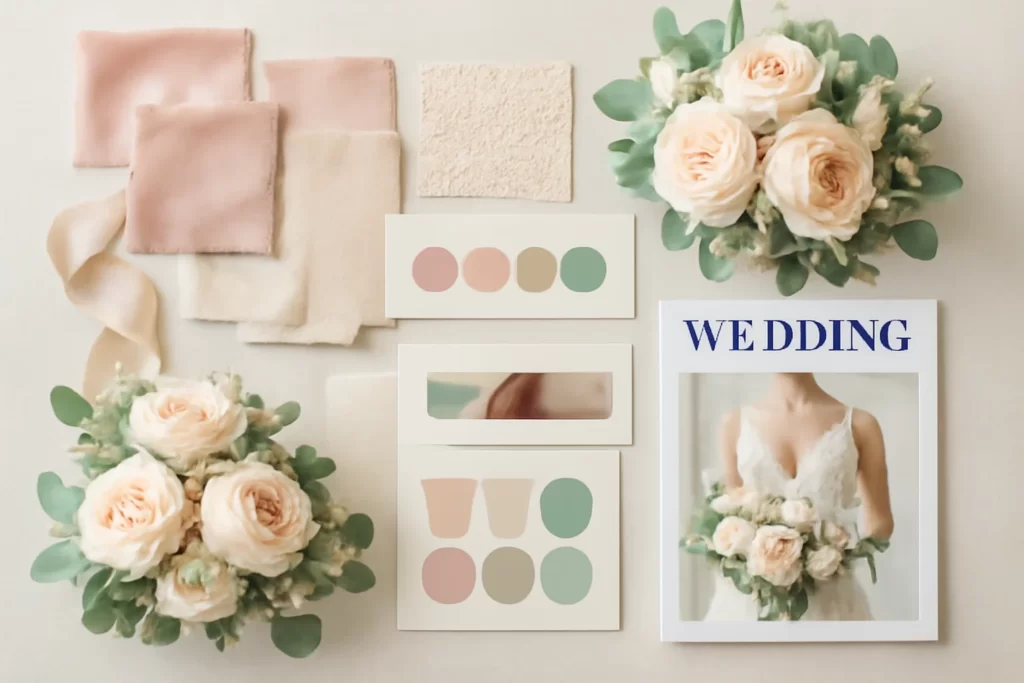
- Celebrate and set a vision. Take time to enjoy your engagement. Begin talking about the kind of wedding you want (theme, formality, season) and gather inspiration from magazines or social media. The Knot notes that couples often use the early engagement period to research ideas and create a wedding vision.
If you’re on the East Coast, it’s worth exploring different venues in Washington DC to see which align with your vision. From modern rooftops to classic ballrooms, locking down your style early can simplify the rest of your decisions.
- Choose a general timeframe. Decide roughly when you’d like to marry (season or year) and discuss who will help fund the wedding. This sets the stage for budgeting and guest list planning later.
- Start an engagement party (optional). If you plan to have an engagement or welcome party, now is a great time to schedule it and start celebrating with family and friends.
- Create organizational tools. Set up a wedding-specific email or a planning notebook. Begin a guest list spreadsheet and budget tracker. Establishing these tools early will help you stay on top of details as tasks ramp up.
12 Months Out
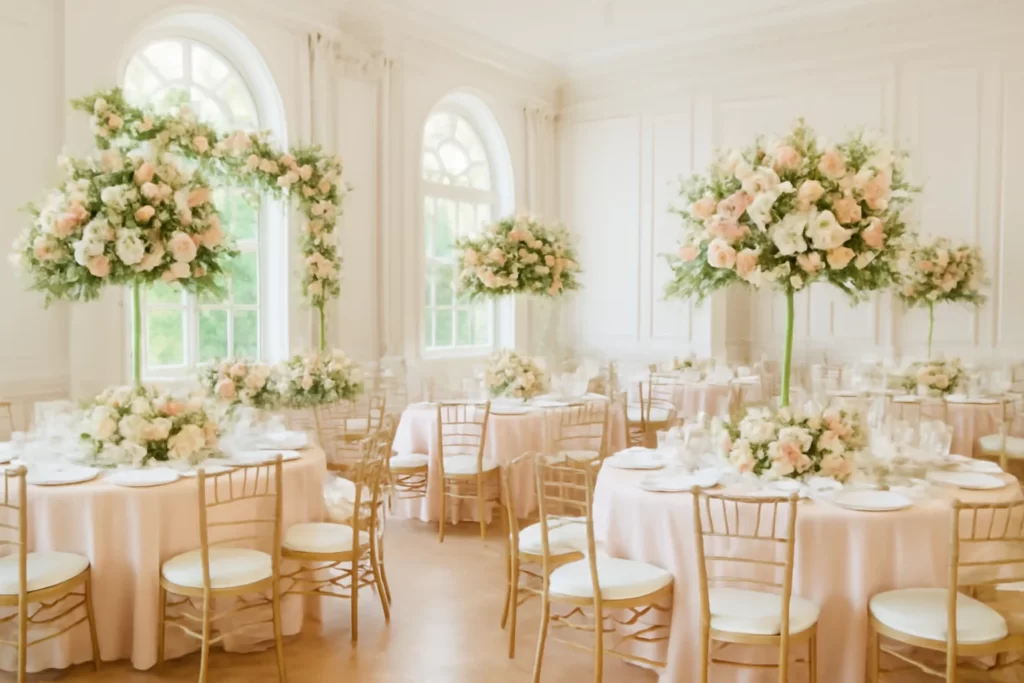
- Set your budget and guest list. This first task will guide every other decision. Have a frank conversation with anyone contributing to costs, then draft a preliminary guest list to estimate headcount. Adjust your budget as needed (for example, allocating more for venue vs. decor).
Couples planning in other locations may consider destination options too. For example, there are affordable wedding venues in San Antonio that provide excellent packages for budget-conscious celebrations without compromising elegance. - Define priorities. Decide what matters most (venue, entertainment, photography, etc.) so you can allocate funds accordingly. This helps avoid last-minute trade-offs.
- Book your venue (and set the date). Popular venues and dates fill up quickly. Industry experts recommend reserving your venue about a year in advance. Locking in the venue establishes your wedding date and lets you move forward with other bookings.
- Hire a planner/coordinator (if desired). If a full-service wedding planner fits your budget, hire one now to help guide the process. At minimum, plan to book a day-of coordinator later. A planner can handle vendor sourcing and logistics, saving you time and stress.
- Gather style inspiration. Browse real wedding photos and create a mood board for colors, decor, and attire. Knowing your style will help narrow vendor choices (photographer, florist, etc.) as you book them.
11 Months Out

- Finalize date and venue. By this point, your wedding date should be set in stone. Book (or confirm) the reception and ceremony sites if you haven’t already. As The Knot notes, hotels and venues “fill up quickly with weddings,” so confirming your location about a year out is wise.
If budget isn’t your biggest concern and you’re aiming for luxury, you may want to look at the best wedding venues in San Antonio. These venues often offer all-inclusive services, making planning more streamlined. - Book key vendors. With a date in hand, start reserving your top vendors. Typical priorities are photographer/videographer, caterer, florist, band/DJ, and officiant. You don’t have to book every vendor immediately, but aim to hire your most important ones soon, as the best pros get booked 12+ months ahead.
- Choose your wedding party. Decide who will stand with you on the big day. Finalize your list of bridesmaids, groomsmen, flower girls, etc. Ask them early so they can save the date for their own attire and responsibilities.
- Refine your guest list. Now’s the time to trim or finalize your invite list. Talk through must-invite family and friends, and make any tough calls on guest count. A finalized guest list helps vendors (caterer, venue) plan for headcount.
- Confirm must-have attendees. If you’re torn between a couple of dates, double-check any non-negotiable guests or vendors (e.g. key family members or your favorite photographer) to make sure they’re free. Adjust your plans if needed to include the people and pros you care about most.
10 Months Out

- Hire remaining big vendors. If you haven’t yet, finalize contracts with your photographer and videographer, caterer, band/DJ, and venue’s preferred vendors. These in-demand pros often book up quickly. Zola recommends booking photographers about 10-12 months out.
For those who want something different, browsing unique wedding venues in Washington DC can provide inspiration. Think art galleries, rooftop gardens, or historic mansions that will make your celebration unforgettable. - Finalize honeymoon plans. Select your honeymoon destination and start booking travel and accommodations. (This ensures you snag the best rates.) Also apply for or renew passports now if traveling internationally.
- Create registry and website. Set up your wedding website and gift registry. Share gift preferences and travel info on your site so guests can RSVP and plan ahead. Having your registry ready 6–8 months before the wedding ensures guests can shop early.
- Shop for your attire. Begin shopping for your wedding outfits. Brides often start dress shopping 10–12 months out to allow for alterations and delivery. Similarly, grooms should arrange suits/tuxedos now.
- Plan ceremony logistics. If not already done, meet with your officiant to outline your ceremony. Discuss any premarital counseling or legal requirements.
Among the critical tasks in your monthly wedding checklist is finalising how and when you request guest responses—see our article on What Does RSVP Mean? for etiquette and timing guidance.
9 Months Out
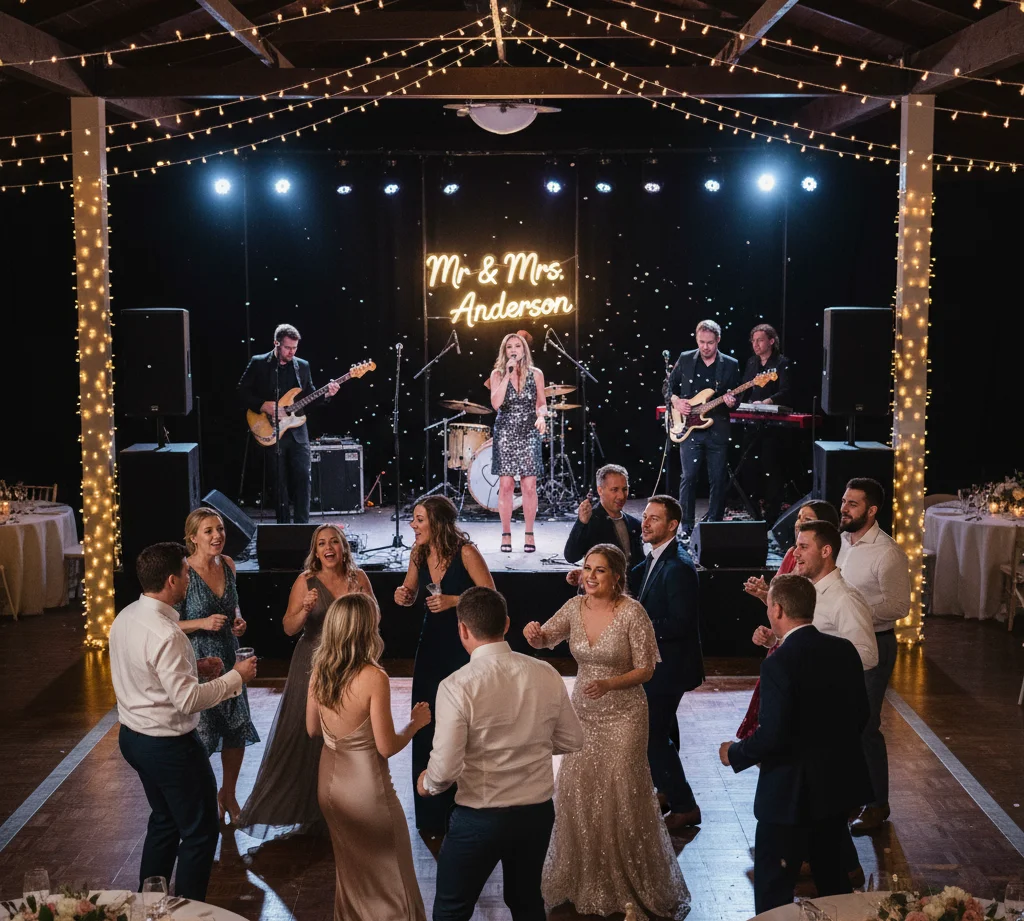
- Design save-the-dates. This month, choose a design for your save-the-date cards and order them. (Mailing at 8–9 months gives guests ample notice.) If you’re eager, you can even send them now.
At this stage, some couples also start looking into costs at specific properties. For instance, reviewing the Hotel Washington wedding cost can help you decide whether this iconic venue fits into your budget. - Book entertainment. Finalize your music by hiring a DJ or band. Decide on your must-play and do-not-play songs. Give these lists to your music pro at least a couple of months before the wedding.
- Secure rentals. Reserve any large rentals now – tents, tables, chairs, linens, specialty lighting, etc. Rental companies often book weddings 9–12 months out, so the sooner you lock in your needs, the better.
- Engagement photos (optional). Consider scheduling an engagement photo shoot. It’s a great chance to get to know your photographer and have fun portraits you can use on your wedding website or save-the-dates.
- Continue honeymoon planning. If you haven’t booked your honeymoon yet, make reservations for flights and hotels. Make sure all travel documents (passports, visas) are in order.
8 Months Out

- Mail save-the-dates. Send out your save-the-date cards to all invited guests. The Knot recommends mailing these about eight months before the wedding (even earlier for destination events). This gives friends and family plenty of time to make travel plans.
If you’re hosting in DC, it’s also helpful to start narrowing down your Washington wedding reception options. Reception spaces often have specific requirements for food, music, or decor, so it’s smart to get clarity early. - Arrange wedding insurance. Especially after recent years, many couples safeguard their investment with a wedding insurance policy. Consider coverage for deposits, vendor cancellations, or unexpected issues.
- Begin honeymoon scheduling. Book your flights, honeymoon suite, and any excursions. Finalize travel details so you can relax post-wedding. (This is also a good time to renew your passports if needed.)
- Finalize vendors. Confirm contracts and details with your caterer, florist, and any remaining big-name vendors. By now, all your major pros should be secured.
- Register your registry and website. Ensure your wedding registry and website are published and up to date. Include details about gift preferences, accommodations, and a timeline overview for guests.
7 Months Out
- Order wedding party attire. Once your own outfits are planned, order the bridesmaids’ dresses and groomsmen’s suits. Bridal store staff recommend ordering bridesmaid dresses at least 3–4 months before the wedding to allow for sizing adjustments.
- Finalize vendor contracts. By this time, all vendors (caterer, photographer, florist, etc.) should be hired. Double-check that deposits are paid and contracts signed. If you’re using a planner or coordinator, schedule a meeting to review each vendor’s responsibilities.
- Book rehearsal dinner venue. If you plan a rehearsal dinner, secure the location now (often one or two days before the wedding). Many venues book rehearsal spaces up to a year in advance, so lock it in before someone else does.
- Consider additional services. If you want extras like a photo booth or special entertainment, book them now. Ask your caterer about catering extras (late-night food, dessert bars) while planning the main menu.
- Take a breather. It’s easy to get overwhelmed at this stage. Plan a little self-care: schedule a spa day or date night (wedding talk off-limits!) to stay relaxed.
6 Months Out

- Attend premarital counseling (optional). If you or your officiant suggest it, complete any premarital counseling or courses now. It can strengthen your communication and readiness for marriage.
This is also a good time to understand the flow of a wedding ceremony and reception. Knowing the differences and how they typically unfold can help you finalize your order of events smoothly. - Shop for wedding bands. Begin choosing your wedding rings about 6–8 months in advance. This allows time for custom design or resizing. Don’t delay – you’ll want the bands in hand well before the ceremony.
- Book hair and makeup. Hire your hairstylist and makeup artist and schedule a trial run. Six months out is a good window to secure these pros. This gives you time to perfect your bridal look without rush.
- Finalize invitation design. Complete the design and wording for your wedding invitations (and all matching stationery). Order them now so they’ll be ready to send at 2–3 months out.
- Plan menu and cake. Work with your caterer to finalize the reception menu and schedule a cake tasting (if applicable). Many caterers start menu planning 6–8 months in advance, and cake bakers often book in this timeframe as well.
5 Months Out
- Order invitations. Purchase your formal wedding invitation suite. These can be mailed 8–10 weeks before the wedding, but ordering now ensures time for printing and addressing.
- Plan the reception menu. Confirm final menu details and any special dietary needs with your caterer. Also arrange your wedding cake: choose flavors and place the order.
- Buy extra outfits. Shop for attire for all pre-wedding events (bridal shower, bachelor/ette parties, rehearsal dinner). Make sure you have dresses or suits ready for each celebration so you’re not scrambling later.
- Finalize honeymoon. You should have flights and hotels booked by now. Confirm all honeymoon reservations and prepare any travel paperwork.
- Book your officiant. If you’re not marrying in a house of worship, secure an officiant now. If you are using a family member or friend, make sure they’re legally able and begin discussing ceremony plans.
- Begin beauty prep (optional). Start any pre-wedding beauty routines (skincare, teeth whitening, etc.) with enough lead time for results and any touch-ups.
4 Months Out
- Send out bridal shower and rehearsal dinner invites. (Typically these are handled by hosts, but confirm the invites went out.)
- Plan ceremony music. Choose your processional, recessional, first dance, and parent dance songs. Compile must-play and do-not-play lists for your DJ or band.
- Personalize details. Design any custom decorations, signage, or favors now – custom items often require several weeks to produce.
- Finalize ceremony programs. If you’re printing programs, lock in the design and get them printed. Having them ready well before the wedding prevents last-minute rushes.
- Confirm rentals and decor. Check in with your rental companies (tents, chairs, linens) to make sure everything you need is reserved for the wedding date.
3 Months Out
- Enjoy your bridal shower. Relax and have fun with the celebrations planned by your friends and family.
- Purchase thank-you gifts. Buy or order gifts for your wedding party and close family to give on the wedding day. This is a meaningful way to show appreciation.
- Schedule hair and makeup trials. Have a trial run to finalize your wedding day look. Adjust any styles until you’re happy with the result.
- Send out wedding invitations. Mail your formal invitations about 8–10 weeks before the wedding. Be sure to include RSVP cards and envelopes, or include online RSVP instructions on your website.
- Start working on your seating chart. Begin grouping guests and drafting a seating plan based on families and relationships. You’ll finalize it as RSVPs come in.
- Meet with your officiant. Go over ceremony details, readings, and any personal vows. Make sure both you and your officiant are clear on the program.
2 Months Out
- Host bachelor/bachelorette parties. Have fun celebrating with your closest friends. This is the time to relax a bit before the final planning push.
- Write your vows. If you’re writing personal vows, start drafting them now so you’re not rushed. Rehearse your vows out loud to make sure they’re perfect.
- Prepare wedding favors/welcome bags. Buy and assemble any favors or welcome gifts for guests. Pack them so they’re ready for the wedding day.
- Check RSVPs and follow-up. Review who has and hasn’t responded. Reach out to guests who are late on RSVPs to get a final count.
- Meet with your vendors. Touch base with all your vendors and planner to confirm details and timeline. Provide any final song lists, photo shot lists, or ceremony scripts at this time.
- Send final payments. Pay any remaining balances or tips to vendors if required. Put payments/tips in labeled envelopes to hand out on the wedding day.

21Fun – Casino Party Rentals in California
1 Month Out
- Apply for marriage license. Visit your local clerk’s office to obtain your marriage license. (Requirements and lead times vary by state, so check your state’s rules.) Don’t wait until the last minute – some states require a waiting period once you apply.
- Finalize attire. Ensure all wedding outfits are perfectly fitted. Complete any last alterations to your dress, suit, and wedding party attire. Make sure everyone’s outfits are collected and ready.
- Confirm accommodations. Confirm room blocks and accommodations for out-of-town guests. Send reminders via your wedding website or email if needed.
- Finalize seating chart and timeline. Finish your seating chart and give it to your planner/coordinator. Create a detailed wedding day timeline (ceremony start, cocktail hour, dinner, first dance, etc.) and share it with the venue and vendors.
- Plan marriage certificate. Learn how and when to file your marriage certificate after the wedding. Some states only give a small window for filing after the ceremony.
2 Weeks Out
- Confirm RSVPs and head count. Do a final check on RSVPs and give the venue/caterer your final guest count. This is critical for meal planning and seating charts.
- Meet with planner/coordinator. Sit down with your planner or day-of coordinator to review the final timeline and responsibilities. Make sure everyone is on the same page.
- Give vendors final instructions. Provide your photographer with any shot list of must-have photos. Give musicians any final song lists or ceremony cues. Confirm arrival times and key contacts.
- Share music selections. Hand off your music playlists (“do-play” and “do-not-play” lists) to the DJ or band.
- Book final beauty appointments. Schedule any last beauty treatments you want before the wedding (manicure/pedicure, hair color touch-up, teeth whitening, etc.). Avoid any new or drastic treatments – stick with what you know works.
- Finalize your vows. Make any final edits to your vows and start practicing. You’ll want to know them by heart (or have them printed in clean copy) well before the ceremony.
Wedding Week
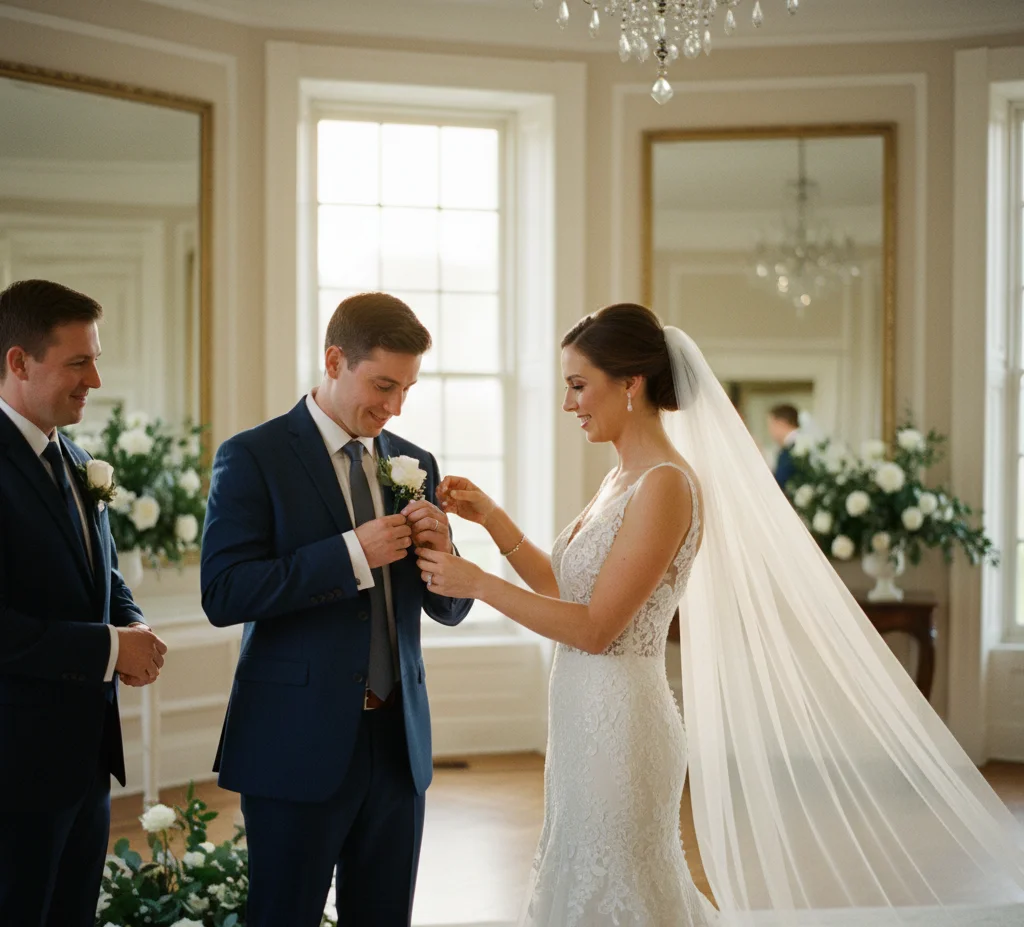
- Give venue final head count. Call your venue (or coordinator) with the exact number of guests. This helps the catering staff prepare and ensures no surprise charges.
- Prepare wedding attire. Press or steam your wedding dress and suit so they look crisp. Careful preparation ensures you look your best on camera.
- Pack for the honeymoon. If you’re leaving soon after the wedding, pack your bags now so you don’t have to worry about it later. Double-check all travel documents (passports, tickets) are in your carry-on.
- Confirm vendor timing. Reach out to vendors one last time to double-check the schedule for the big day. Provide a point of contact (often your planner or a family member) for any last-minute questions.
- Rehearse the ceremony. Conduct a rehearsal with your wedding party and officiant (usually the day before the wedding). This final walkthrough ensures everyone knows where to stand and what to do.
- Relax and enjoy. Take some time to rest, hydrate, and have a final dinner (or date night) without wedding talk. You’ve done the planning—now enjoy the excitement of what’s to come!
Sources:
- How Long Does It Take to Plan a Wedding? – brides
- So, How Long Does It Actually Take to Plan a Wedding? – knot
- Exactly How Far Out to Book Each Wedding Vendor – Zola
Frequently Asked Questions
What is the ideal time to plan a wedding?▾
Most experts recommend 12–15 months of planning time before the wedding. This helps secure top vendors, finalize details, and avoid last-minute stress.
Why should I use a month-by-month wedding planning checklist?▾
A timeline breaks down big tasks into manageable steps, helping couples stay organized, book vendors early, and reduce last-minute rushing.
What should I do first after getting engaged?▾
Begin by celebrating your engagement, setting a wedding vision, discussing your budget, starting a guest list, and deciding on a general timeline.
When should I book my wedding venue?▾
It’s best to book your venue about 12 months in advance since popular locations and dates fill up quickly.
What vendors should I book first for my wedding?▾
Top-priority vendors to secure early include the photographer, videographer, caterer, florist, DJ/band, and officiant. These often book over a year in advance.
When should I send out save-the-dates?▾
Save-the-dates are typically sent 8–9 months before the wedding, and even earlier for destination weddings, so guests have plenty of notice.
When should I start shopping for a wedding dress?▾
Brides often begin dress shopping 10–12 months before the wedding to allow for multiple fittings and alterations.
What tasks should be done 6 months before the wedding?▾
At six months out, focus on booking hair and makeup artists, finalizing your menu and cake order, ordering stationery, and shopping for wedding bands.
When should I mail wedding invitations?▾
Invitations are usually mailed 8–10 weeks before the wedding date, giving guests time to RSVP and make plans.
How soon should I finalize my guest list?▾
Most couples finalize their guest list around 10–11 months before the wedding, which helps set the budget and confirm vendor headcounts.
What should I do one month before the wedding?▾
At one month out, you’ll want to apply for your marriage license, finalize your seating chart, confirm accommodations for guests, and complete final outfit alterations.
When is the best time to host bachelor and bachelorette parties?▾
Bachelor and bachelorette celebrations are best planned about 1–2 months before the wedding, giving couples time to relax before the final planning push.
Why is wedding insurance recommended?▾
Wedding insurance can protect deposits and expenses if vendors cancel, weather interferes, or unexpected issues arise, giving couples peace of mind.
What should couples do during wedding week?▾
In the days leading up to the wedding, couples confirm vendors, give the venue a final headcount, rehearse the ceremony, steam attire, and prepare honeymoon travel essentials.
Related Post
Contact Us
Please provide your contact information with event details. You will be contacted soon.




